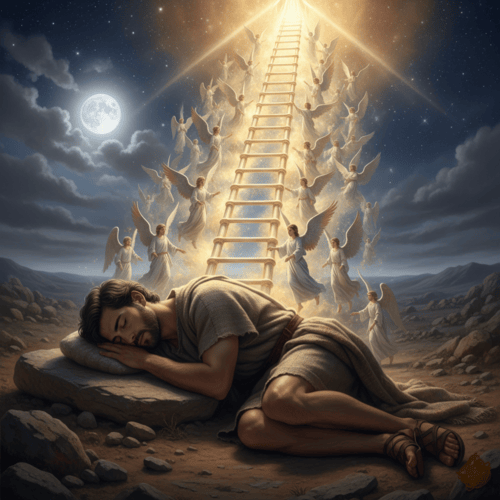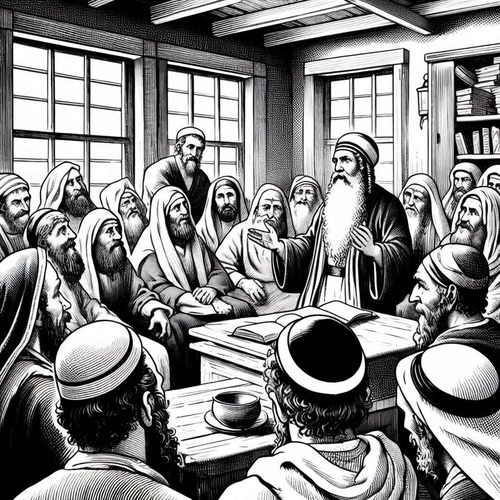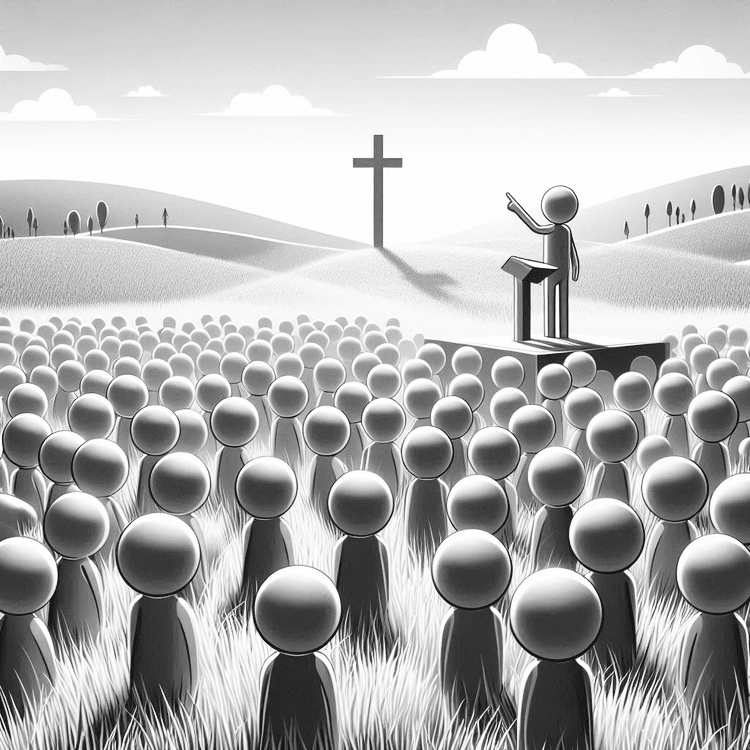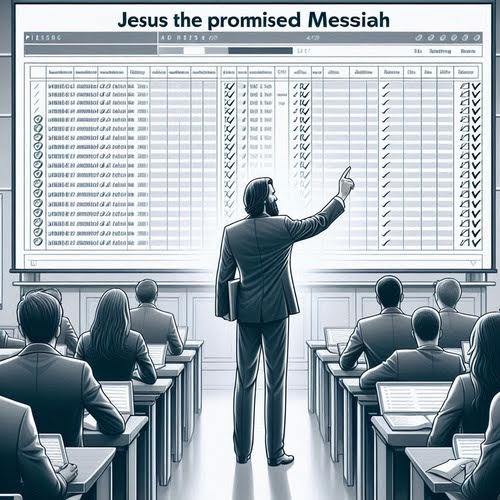Jacob’s Ladder: How Jesus Bridges Earth and Heaven
THE GOSPEL IN GENESIS 28…
A stairway to heaven—humanity has always dreamt of one since the Fall. Every religion offers its own version: each promises we can climb up to God, provided we follow the right rituals, obey the right rules. Or achieve the right enlightenment. Even within Christianity, we’re tempted to turn faith into a ladder of our own making—pray harder, serve more, sin less, and maybe, just maybe, we’ll reach heaven.
But Jacob’s dream in Genesis 28:10–17 shatters this universal human assumption. It teaches the very opposite: man cannot climb to God; God must descend to man.
Jacob’s ladder is a picture of the gospel itself—not a story about human effort to reach God, but about God’s gracious initiative to bridge the infinite divide through His Son, Jesus. As Jesus Himself declares in John 1:51, the ladder is Christ. He is the living connection between heaven and earth, the one Mediator who brings God down to us rather than demanding we climb up to Him. Understanding this ancient vision transforms everything: how we approach God, what we believe about salvation, and where we find our hope. Let’s discover how a fugitive’s dream in the wilderness reveals the heart of the gospel.
A FUGITIVE’S UNEXPECTED ENCOUNTER
Jacob’s desperate situation. And Ours. Jacob was running for his life. Having deceived his brother Esau out of their father’s blessing, Jacob was fleeing north toward his uncle Laban’s household in Haran. He had no tent, no companions, no comfort—just the clothes on his back. And the sheer weight of his guilt. As night fell, he stopped at “a certain place,” took a stone for a pillow, and collapsed into exhausted sleep (Genesis 28:11).
This was no holy site. Jacob wasn’t on a spiritual pilgrimage or seeking a mountaintop experience. He was simply trying to survive. Geographically, he was between his father’s house and his uncle’s land. Spiritually, he was adrift—alienated from his family, uncertain of his future. Why would God even care to seek out deceivers like him?
Yet it’s precisely here, in this wilderness displacement, that God breaks through. Not in a temple. Not in a shrine. Not when Jacob was ready or worthy. This is our first lesson: God meets us not when we’re climbing toward Him, but when we’re flat on our backs. With nowhere else to turn.
THE VISION: HEAVEN TOUCHES EARTH
In his dream, Jacob saw something extraordinary. A ladder—the Hebrew word sullam appears nowhere else in Scripture—stood firmly planted on the earth and reached all the way to heaven. Angels were ascending and descending upon it, moving freely between the divine realm and the earthly one. And at the top (Genesis 28:13), the LORD Himself stood and spoke.
God’s staggering message of grace. He reaffirmed the covenant He’d made with Abraham and Isaac: “I am the LORD, the God of your father Abraham and the God of Isaac. I will give you and your descendants the land on which you are lying” (Genesis 28:13). He promised countless offspring and that through Jacob’s family, all peoples on earth would be blessed. But most personally, God made this promise to a frightened, guilty man: “I am with you and will watch over you wherever you go, and I will bring you back to this land. I will not leave you until I have done what I have promised you” (Genesis 28:15).
Think about what this meant for Jacob. The way between God and humanity was open. Heaven and earth were connected. Despite Jacob’s failures and fears, God was accessible—not because Jacob had earned it, but because God had provided the means. The ladder wasn’t Jacob’s construction project; it was God’s gracious architecture. Jacob woke up stunned: “Surely the LORD is in this place, and I was not aware of it” (Genesis 28:16). He named the place Bethel—”House of God”—recognizing that he’d encountered something sacred in the most unlikely location.
Here’s the crucial point: Jacob didn’t build the ladder. He didn’t climb it. He didn’t even know it existed until God revealed it. Salvation came down to him, not up from him.
JESUS: THE LADDER FULFILLED
Fast-forward roughly 2000 years. Jesus is calling His first disciples, including Nathanael, a sceptical Israelite who wondered if anything good could come from Nazareth. After Nathanael’s confession of faith, Jesus makes a stunning promise: “Very truly I tell you, you will see heaven open, and the angels of God ascending and descending on the Son of Man” (John 1:51).
This isn’t subtle. Jesus is directly identifying Himself with Jacob’s ladder. He’s claiming to be the connection point between heaven and earth, the place where God and humanity meet, the way God’s blessing flows to us.
We cannot climb to God through our works, our merit, or our mystical achievements. The Reformed doctrine of total depravity teaches that humanity, in our fallen condition, cannot bridge the gap between ourselves and a holy God. We’re spiritually dead, unable to take even the first step upward (Ephesians 2:1). Any “ladder” we try to construct—religious performance, moral improvement, spiritual disciplines undertaken in our own strength—crumbles under the weight of God’s perfect righteousness.
God descends to us in Christ. The Incarnation is the ladder planted firmly on earth. “The Word became flesh and made his dwelling among us” (John 1:14). Jesus didn’t stay in heaven and lower down a rope for us to climb. He came all the way down, taking on human flesh, living a perfect life in our place, dying the death we deserved, and rising victorious over sin and death.
Christ is the one Mediator between God and humanity, as Paul declares in 1 Timothy 2:5. The ladder represents this unique mediatorial office. Jesus is fully divine—the top of the ladder firmly planted in heaven, sharing the very nature of God. He is also fully human—the bottom of the ladder rooted in earth, sharing our nature in every way except sin. In His one person, the two natures are united, bridging the infinite distance between Creator and creature.
The Westminster Confession beautifully articulates this: Christ, “being very and eternal God, of one substance and equal with the Father, did, when the fullness of time was come, take upon Him man’s nature” (8.2). He is the perfect and only ladder.
Even the detail about angels ascending and descending has profound meaning. It represents the continuous communion and ministry that flows through Christ. Every divine blessing—grace, mercy, forgiveness, adoption, eternal life—comes down to us through Christ alone. Every prayer, every act of worship, every approach to God ascends through Christ alone. As Jesus Himself said, “No one comes to the Father except through me” (John 14:6). And remarkably, “No one has ever gone into heaven except the one who came from heaven—the Son of Man” (John 3:13). We don’t ascend by our own power; we ascend in Him.
WHAT THIS MEANS FOR US TODAY
So what does Jacob’s ancient vision mean for Christians living in the 21st century? Everything.
- It gives us assurance of access. We can approach God with confidence—not because we’ve climbed high enough spiritually, but because Christ has opened the way. Hebrews 4:14, 16 put it powerfully: The way to God is permanently open. When Jesus died, the temple veil separating humanity from God’s presence tore from top to bottom (Matthew 27:51)—God ripped it open from His side. We now have “confidence to enter the Most Holy Place by the blood of Jesus, by a new and living way” (Hebrews 10:19-20).
- It reveals the gospel pattern: salvation is God’s work alone, from start to finish. This is what Reformed theology means by monergism—salvation is accomplished by God’s action, not a cooperative effort. We don’t climb; we receive (Ephesians 2:8-9). As Paul asks rhetorically, “And if by grace, then it cannot be based on works; if it were, grace would no longer be grace” (Romans 11:6). The ladder comes down; we don’t go up.
- We can rest in Christ’s finished work rather than anxiously striving to earn God’s favour. The ladder is complete. The way is open. Our acceptance before God doesn’t fluctuate with our performance.
- Like Jacob, we can find God in unexpected places. He meets us in our wilderness moments, our stone-pillow nights, our frightened flights from consequences. We don’t have to clean up our lives before approaching God; He comes to us right where we are.
- We live in the reality that heaven touches earth through Christ. The Christian life isn’t about trying to reach an absent God in a distant heaven. It’s about walking with a present Saviour who has brought heaven down to us.
THE LADDER STILL STANDS
Jacob’s ladder wasn’t just a dream for one night in one man’s journey. It was a preview of the gospel, a promise that God Himself would provide the way back to Himself. That ladder is Jesus Christ, and it stands today—planted firmly on earth in the Incarnation, reaching to the highest heavens in His divine nature, providing the only way for sinful humanity to be reconciled to a holy God.
We need not climb—indeed, we cannot. But glory of glories: God has come down to us. The infinite God crossed the infinite distance. Heaven and earth embrace in Jesus Christ. As He Himself declared with simple, breathtaking finality: “I am the way and the truth and the life” (John 14:6).
The ladder is Christ. The way is open. Come.
JACOB’S LADDER: JESUS BRIDGES EARTH AND HEAVEN—RELATED FAQs
Why does Genesis 28:12 say the angels were “ascending and descending” rather than “descending and ascending”? This detail is theologically significant. The ascending-first order suggests the angels were already on earth, ministering to Jacob in his vulnerable state, before returning to heaven with their report. It emphasises God’s providential care was active even before Jacob was aware of it—divine grace precedes human consciousness of that grace. Theologian Derek Kidner notes this shows “the traffic was two-way,” illustrating continuous communion between heaven and earth through God’s appointed means.
- What does the Hebrew word sullam (ladder) really mean, and does it matter? The word sullam appears only here in the entire Old Testament, making its precise meaning somewhat debated. Some scholars suggest it could mean “stairway,” “ramp,” or even “staircase,” similar to a Mesopotamian ziggurat. However, the specific architectural form matters less than its function: it was a divinely-provided means of access between heaven and earth that Jacob could neither construct nor climb himself. The uniqueness of the word may underscore the uniqueness of Christ as the one Mediator.
- How do theologians interpret Jacob’s ladder in relation to Christ? Contemporary Reformed scholars like TM Moore and Sinclair Ferguson emphasise John 1:51 isn’t merely a spiritual application but Jesus’s authoritative interpretation of Genesis 28. Ferguson writes Christ “is the true temple, the real meeting place between God and man,” making Jacob’s Bethel experience a prophetic shadow. Michael Horton highlights how the passage demonstrates the “monergistic” nature of grace—salvation is entirely God’s descending work, not humanity’s ascending effort. These theologians unite in seeing the ladder as central to understanding Reformed soteriology: we are saved by Christ’s coming down, not by our climbing up.
What do verses 16-17 reveal about encountering God? Jacob’s response—“Surely the LORD is in this place, and I was not aware of it” followed by “How awesome is this place! This is none other than the house of God; this is the gate of heaven”—teaches us God’s presence isn’t confined to places we deem sacred or moments when we feel spiritually prepared. From a Reformed viewpoint, this underscores God’s sovereign initiative: He reveals Himself when and where He chooses, often catching us unaware in our ordinary or even shameful circumstances. We don’t create “thin places” where heaven touches earth through our spiritual disciplines; rather, Christ Himself is the permanent “gate of heaven,” making every place where He is proclaimed a potential Bethel. This demolishes both works-righteousness and mysticism—we encounter God not by achieving the right spiritual state but by His gracious self-revelation through Christ.
- Did Jacob misunderstand the vision by making a conditional vow in verses 20-22? Jacob’s vow—“If God will be with me… then the LORD will be my God”—has troubled many readers who see it as bargaining with God. However, Reformed commentators like John Calvin understood the “if” as a Hebrew idiom expressing confidence rather than doubt (similar to “since” or “when”). Jacob isn’t negotiating terms but responding in faith to God’s unconditional promises. His vow to give a tenth and build an altar represents grateful commitment, not conditional obedience. This interpretation aligns with Reformed theology’s understanding of covenant: God’s promises are unconditional, but they produce responsive obedience in the faithful.
- Why does God identify Himself as “the God of Abraham and Isaac” rather than “the God of Jacob”? At this point in the narrative, Jacob hasn’t yet become Israel, and his relationship with God is defined by the covenant promises made to his grandfather and father. The identification emphasises covenant continuity and grace—God relates to Jacob not based on Jacob’s merit (he’s currently a deceiver and fugitive) but based on His prior commitment to Abraham’s line. From a Reformed perspective, this illustrates the doctrine of election and covenant theology: we’re saved not by our individual worthiness but by being grafted into God’s chosen people through Christ. God’s self-identification here is grace speaking to an unworthy recipient.
How does Bethel (“House of God”) connect to New Testament teaching about where God dwells? Jacob called the place Bethel because he recognised it as God’s dwelling place, yet the New Testament radically redefines where God’s house is located. Jesus tells the Samaritan woman true worshipers won’t worship in specific locations but “in spirit and truth” (John 4:21-24). Paul declares believers themselves are “God’s temple” where the Spirit dwells (1 Corinthians 3:16). This progression fulfils what Jacob’s ladder symbolised: through Christ, the meeting place between God and humanity isn’t a geographical location but a person—Jesus Himself—and by extension, all who are in Him. Every believer becomes a “Bethel,” a house of God, because Christ the Ladder dwells within us by His Spirit.
JACOB’S LADDER: JESUS BRIDGES EARTH AND HEAVEN—OUR RELATED POSTS
Editor's Pick

Does God Know the Future? All of It, Perfectly?
Think about this: our prayers tell on us. Every time we ask God for something, we’re confessing—often without realising it—what [...]

Can Christian Couples Choose Permanent Birth Control?
Consider Sarah, whose fourth pregnancy nearly killed her due to severe pre-eclampsia, leaving her hospitalised for months. Or David and [...]

Bone of My Bones: Why Eve Was Created From Adam’s Body
"This at last is bone of my bones and flesh of my flesh!" Adam's joyful exclamation upon first seeing Eve [...]

Is Calvinism Fatalism in Christian Disguise? Think Again
We hear the taunt every now and then: "Calvinism is just fatalism dressed up in Christian jargon." Critics argue Reformed [...]

Can Churches Conduct Same-Sex Weddings?
In an era of rapid cultural change, churches across America face mounting pressure to redefine their understanding of marriage. As [...]

Gender Reassignment: Can Christian Doctors Perform These Surgeries?
In the quiet of a clinic, a Christian physician faces a challenging ethical question. A patient sits across the desk, [...]

‘What Sorrow Awaits You Who Are Rich…’: What Does Jesus Mean?
The words hang in the air like a sword over comfortable Christianity: “What sorrow awaits you who are rich, for [...]
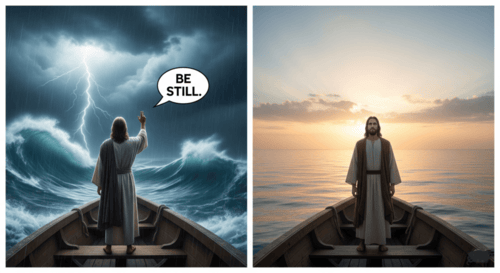
Does the Bible Clearly Teach the Deity of Christ?
Critics argue Jesus never explicitly claimed to be God. Others suggest the doctrine emerged centuries later through philosophical speculation. But [...]

The Holy Spirit’s Indwelling: How Can I Be Sure I Have It?
“Am I truly saved? How can I know for certain that the Holy Spirit lives within me?” If you’ve wrestled [...]
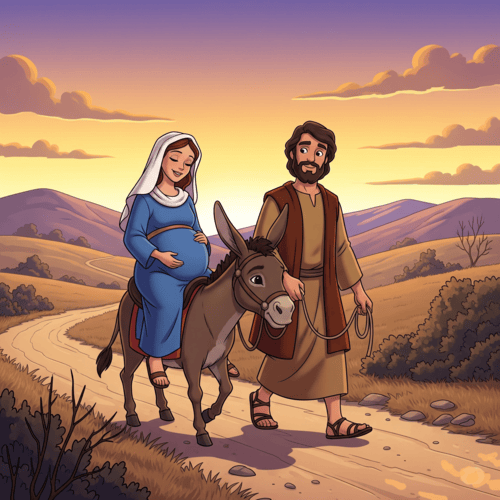
Did Mary Remain a Virgin? A Biblical Case Against Perpetual Virginity
The question of Mary’s perpetual virginity has divided Christians for centuries. While Catholic and Orthodox traditions affirm Mary remained a [...]
SUPPORT US:
Feel the Holy Spirit's gentle nudge to partner with us?
Donate Online:
Account Name: TRUTHS TO DIE FOR FOUNDATION
Account Number: 10243565459
Bank IFSC: IDFB0043391
Bank Name: IDFC FIRST BANK


